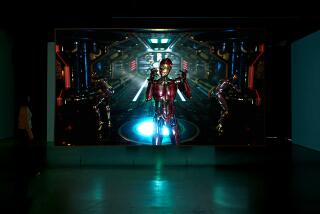‘Being Digital’ Appears as Next Curve on Information Highway
- Share via
CAMBRIDGE, Mass. — He talks about computer bits replacing human atoms in communications and world trade, but multimedia guru Nicholas Negroponte believes the dawning digital age will make workers more creative.
“The change from atoms to bits is irrevocable and unstoppable,” says Negroponte, head of the Massachusetts Institute of Technology’s futuristic Media Lab and author of a new book, “Being Digital” (Alfred Knopf).
In an interview at the Media Lab--a white modernist cube designed by I.M. Pei--Negroponte said fast access to information will create new ways of thinking and link multinational companies.
“This is a revolution of atoms to bits that will turn everything upside down,” Negroponte said. “One of the biggest changes is you can be global and small at the same time. Until now multinationals were huge companies.”
The coming digital age will thrust as big a change on the work force as did the revolution from an agrarian to an industrial society, Negroponte said.
He predicts many people will be thrown out of work over the next decade as fully automated systems enter white collar workplaces in much the same way that factory machinery has replaced unskilled labor performing repetitive tasks.
“Job fulfillment will be in the cottage industry. People will start commerce on the Internet, which will be a big job creator,” he said. “But this requires people to take more initiative.”
The cottage multinationals, which will deal in information businesses, will be able to take global events and bypass large companies by customizing information for local consumption.
One example is a joint project of the Newhouse news group and the Media Lab, which created a newspaper catering to 10,000 Indian residents of Jersey City, N.J. The two-page paper is delivered electronically to printers in delicatessens.
Using free-lance writers in Indian cities like Bangalore and Madras, the Indian Journal carries articles with “hometown” angles.
It is ironic that Negroponte, who says he is dyslexic and doesn’t like to read, issued a book about “Being Digital” rather than publishing on-line.
More to Read
Sign up for our Book Club newsletter
Get the latest news, events and more from the Los Angeles Times Book Club, and help us get L.A. reading and talking.
You may occasionally receive promotional content from the Los Angeles Times.










